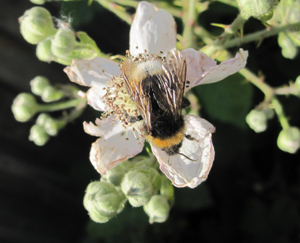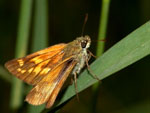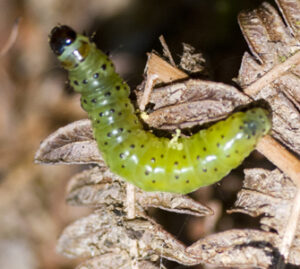Moths – secret pollinators?

Honeybees, bumblebees and butterflies are always cited as being important for flower pollination. Indeed, without them many of our food crops would ‘fail’. But what about moths? Well, recent research has found that they too are efficient pollinators. A recent study compared the role of nocturnal and day time pollinators. Much scientific research has focused on daytime pollinators, like honey bees and bumblebees, but little is known about the night time pollinators.
So a study was devised, which focused on the day and night visitors to bramble flowers. Bramble may be a bit prickly to us but for bees and other insects it is important source of nectar and pollen, from early spring through to autumn. The study was carried out out in the summer moths (when night is only one third of the daily cycle). Trail cameras were used to record visitors to the bramble flowers over three days, also special bags were used to cover the flowers for different times in order to determine the effectiveness of the different pollinators on pollination and fruit formation.
- One group of the bramble flowers was covered up for the three days.
- A second group was bagged up for the day time.
- The final set was covered only at night.
The number of pollinator visits was recorded as was the resulting pollination and fruit formation.
 At night, moths were the only insect visitors of the pale pink / white flowers of the bramble, and they also proved to be very effective pollinators. It is not clear why moths were more effective, perhaps the time they spend visiting a flower is a critical factor. They do spend more time rummaging in a flower than day time insects [hoverflies, butterflies, bees etc].
At night, moths were the only insect visitors of the pale pink / white flowers of the bramble, and they also proved to be very effective pollinators. It is not clear why moths were more effective, perhaps the time they spend visiting a flower is a critical factor. They do spend more time rummaging in a flower than day time insects [hoverflies, butterflies, bees etc].
There are only some sixty species of butterfly in the UK but over two thousand species of moth. But like butterflies, moths are vulnerable with many of our larger moths in decline. The challenges that they face as the same as those that threaten many insects namely:
- Pesticides
- Habitat loss
- Climate change
 But moths face an additional challenge - artificial light at night. This interferes with the feeding behaviour of their larvae / caterpillars, it also affects the feeding and breeding of the adults. Thus, moths are not only important pollinators but a vital component to the biodiversity of an ecosystem. They also are a food source bats and birds.
But moths face an additional challenge - artificial light at night. This interferes with the feeding behaviour of their larvae / caterpillars, it also affects the feeding and breeding of the adults. Thus, moths are not only important pollinators but a vital component to the biodiversity of an ecosystem. They also are a food source bats and birds.
Moths can be helped by:
- By allowing a patch of brambles and / or wild flowers in your garden
- Persuading the council to allow wild flowers to grow and flourish on roadside verges, ‘spare’ plots of land etc.
- Asking the local council to reduce night time lighting where it safe to do so.
- At home, limiting the use of outdoor lights at night, draw curtains and blinds to limit light spill to the exterior.
As insects are in decline generally, (see the woodlands.co.uk splatometer blog) it is important to help our pollinators - ensuring that they still ‘have a home’ at the end of the day.

Leave a comment